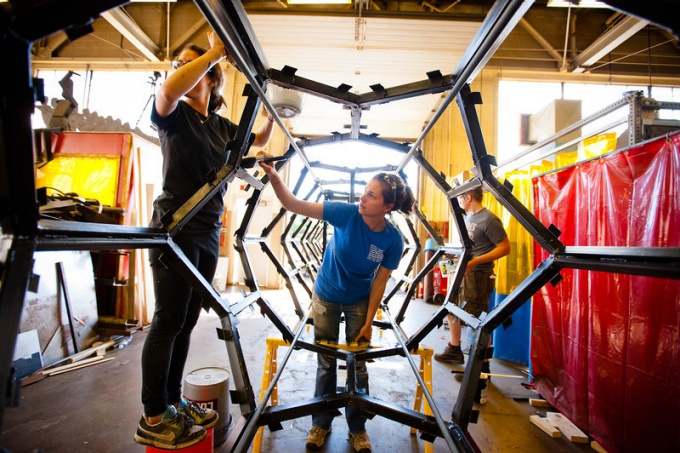Why Architecture in Buffalo?

Learn by doing in your study of architecture at the School of Architecture and Planning.
Our program will prepare you to see the full implications of what architecture does for the built environment, by proposing future forms of habitation that make aesthetic and cultural contributions to society and inspire social imagination.
As architects you will have a critical role to play in the progress of society. Your work will be the future built environment that will condition how we live, work and socialize. You will need to approach the task of design with great skill, vision and confidence knowing that the pressing questions of architecture have yet to find appropriate answers.
Our undergraduate Bachelor of Science (B.S.) program is formulated around a studio-based curriculum that emphasizes thinking through making. The department boasts one of the largest material shops for an architecture school that includes conventional and digital fabrication technologies. Students work directly with materials and tools, producing models and prototypes that help them connect the formal basis of architecture with its physical manifestation. The undergraduate studios develop design thinking and crafting skills that allow students to communicate their ideas in the most professional ways. In addition, the design studios are supported by lectures and seminars in the history, theory and technologies of architecture. These courses help students understand that architecture is a multi-disciplinary profession that combines knowledge from the humanities, arts and engineering. We pride ourselves on a design curriculum that teaches students how to effectively connect the art of design with the science of building.
Our graduate professional Master of Architecture (MArch) and post-professional Master of Science (MS) degrees provide students an opportunity to engage research-based design enquiry. Built on four graduate research groups: Inclusive Design, Ecological Practices, Material Culture and Situated Technologies, the program takes advantage of the cutting-edge research being conducted at the School of Architecture and Planning. Students have the opportunity to conduct their studies in one, two or all the Graduate Research Groups. Each group ties architectural design to topics of concern that presently and in the future will influence the design of the built environment. Inclusive Design addresses human factors like disability, gender and diversity, Ecological Practices explores the influence of environmental factors like energy, biodiversity and sustainability, Material Culture addresses the poetics of construction and assembly through traditional and new materials, while Situated Technologies explores ubiquitous digital technologies in the design of responsive architecture and interactive urbanism.
The Department of Architecture takes its role as part of a public research university seriously. Our mission is tied to serving the public and being a forum for public debate. Through our lecture series, fellowships, sponsored chairs, community engagement, research and pedagogy we invite the public to engage our students and faculty to discuss local and global issues as they affect the design of the contemporary and future built environment.